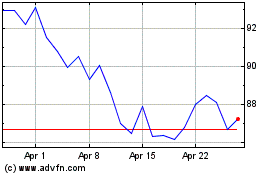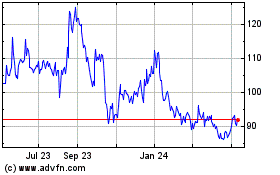By Ruth Bender
BERLIN -- A small German company's success in coming up with the
West's first Covid-19 vaccine is drawing attention from investors
in a country where biotech has struggled to raise funding in recent
years.
Mainz-based BioNTech SE partnered with U.S. pharmaceutical giant
Pfizer Inc. to develop the first coronavirus vaccine approved in
the U.S. and Europe last year. Domestic rival CureVac NV is hoping
its own shot will get approved in Europe in the coming weeks.
Now, more German and international investors are looking to
invest in search of the next hidden gem in German biotech, venture
capitalists, executives and analysts say.
In 2020, German biotech companies raised a record of EUR3.05
billion, equivalent to $3.7 billion, through venture capital, share
offerings and convertible bonds, triple the amount for 2019,
according to Ernst & Young. While half of that went into
BioNTech and CureVac, companies working on non-Covid-19 related
treatments also got important financing rounds.
"People in the industry used to say, 'If a company isn't based
in Boston or California or in the U.S. generally, then it will be
difficult to attract U.S. investors,' " said Claudia Ulbrich,
founder and chief executive of Hanover-based Cardior
Pharmaceuticals GmbH, which is developing RNA therapies against
heart failure and seeking to raise EUR50 million to EUR60 million
for a crucial clinical study. "That's changing," Dr. Ulbrich
said.
Germany, once known as the world's pharmacy, was a leading
source of medical innovation during the 19th and 20th centuries.
Its scientists, for instance, discovered X-rays and invented
aspirin.
Yet Germany-based startups have struggled to attract funding in
recent years, investors and executives said.
Much investment in the sector has concentrated on the U.S.,
where firms raised $100 billion last year, according to Ernst &
Young. China's biotech sector, while still a fraction of the U.S.,
has also grown rapidly recently, as the government has prioritized
the sector.
Luring investment in biotech is always difficult because of the
heavy risks involved. Most experimental drugs fail testing. Adding
to the difficulties that German biotech startups faced raising
capital has been a dearth of tax and other government incentives
encouraging the risky investments, said Alexander Nuyken, head of
Ernst and Young's Life Sciences branch for Europe, Middle East,
India and Africa.
For years, few Germans invested heavily in German biotech and
their investments were met with skepticism, said Friedrich von
Bohlen, who manages the biotech investments of SAP SE software
company co-founder Dietmar Hopp. "It was like the joke of the town:
How can these 'idiots' sink so much nice money into such 'idiotic'
companies?" Mr. von Bohlen said.
Mr. Hopp holds just under 50% of CureVac directly and via his
investment company Dievini Hopp Biotech Holding GmbH, according to
Mr. von Bohlen.
BioNTech had never brought a product to market before the
pandemic and ended 2019 with a loss of EUR179 million. In March, it
forecast sales of roughly EUR9.8 billion for 2021 from its vaccine.
Its shares have more than quadrupled in value since the World
Health Organization declared a pandemic on March 11, 2020.
The success has heightened U.S. venture capitalists' interest in
German startups, said Markus Enzelberger, a Switzerland-based
partner at U.S. healthcare fund Versant Ventures. Last year,
Versant teamed up with Boston-based RA Capital Management to lead a
EUR66 million financing round for T-Knife GmbH, of Berlin, which is
developing cell therapies to treat solid tumors.
Many wealthy Germans are also reassessing their previous
aversion to German biotech firms, according to investment fund
managers.
"We're getting calls from family offices and other people saying
they would like to invest with us in healthcare," said Thomas
Strüngmann, who with his twin brother, Andreas, is a founding
investor and majority shareholder in BioNTech. The brothers, who
became billionaires with the sale of their generic drug company
Hexal to Novartis AG in 2005, are among the small group of Germans
who have been investing in German biotech for the past 15
years.
Munich-based venture-capital firm MIG AG has been fielding
inquiries from family offices and wealthy individuals in Germany
since the firm paid its own investors EUR600 million in dividends
after selling most of its 6% stake in BioNTech, the highest single
payout in the firm's history.
"People realize the risk is manageable and that the return can
be much larger than previously thought," said MIG partner Matthias
Kromayer.
While German biotech executives and their investors hope the
current enthusiasm will revive Germany's contributions to drug
development, they warn hurdles remain.
One problem is that Germany still lacks a pool of experienced
executives to lead companies to commercial success, said RA Capital
managing director Josh Resnick.
T-Knife, for example, just hired a CEO from the U.S. CatalYm
GmbH, a startup that raised EUR50 million last year and is working
on an experimental cancer drug designed to help the patient's
immune cells battle tumors, recently hired Phil L'Huillier from
Merck & Co.
UnternehmerTUM, a startup incubator that was founded by Susanne
Klatten, heir to the family that controls car maker BMW AG, in the
middle of the pandemic last year added a healthcare venture hub to
boost company creation in that space.
Write to Ruth Bender at Ruth.Bender@wsj.com
(END) Dow Jones Newswires
May 10, 2021 07:14 ET (11:14 GMT)
Copyright (c) 2021 Dow Jones & Company, Inc.
BioNTech (NASDAQ:BNTX)
Historical Stock Chart
From Mar 2024 to Apr 2024

BioNTech (NASDAQ:BNTX)
Historical Stock Chart
From Apr 2023 to Apr 2024
